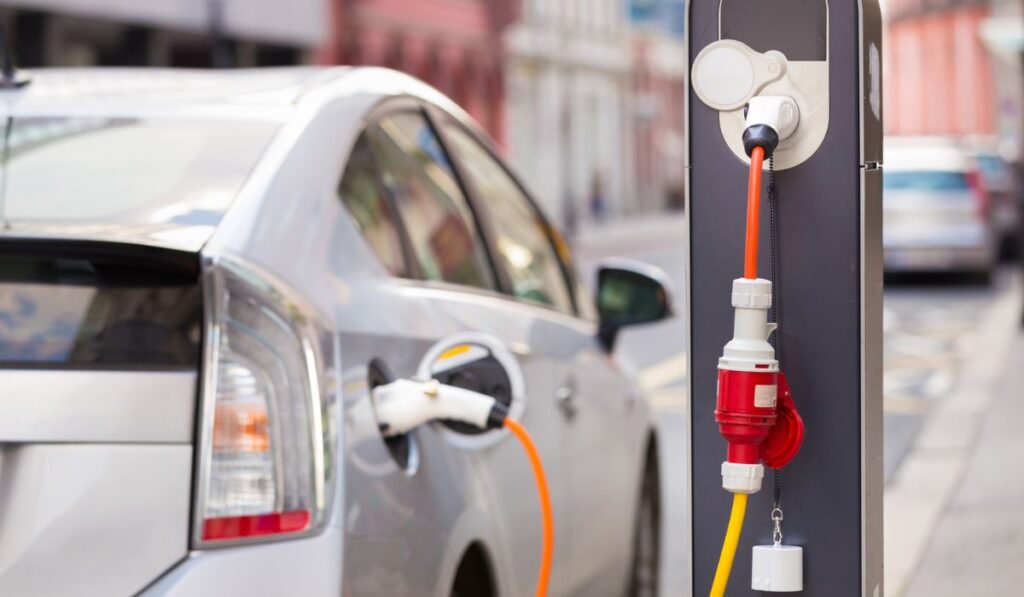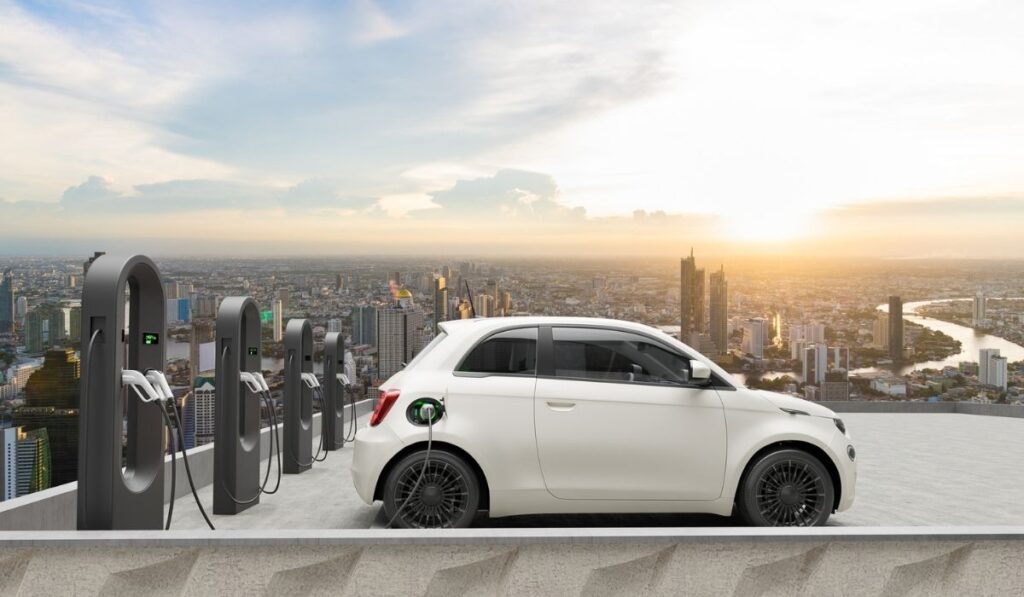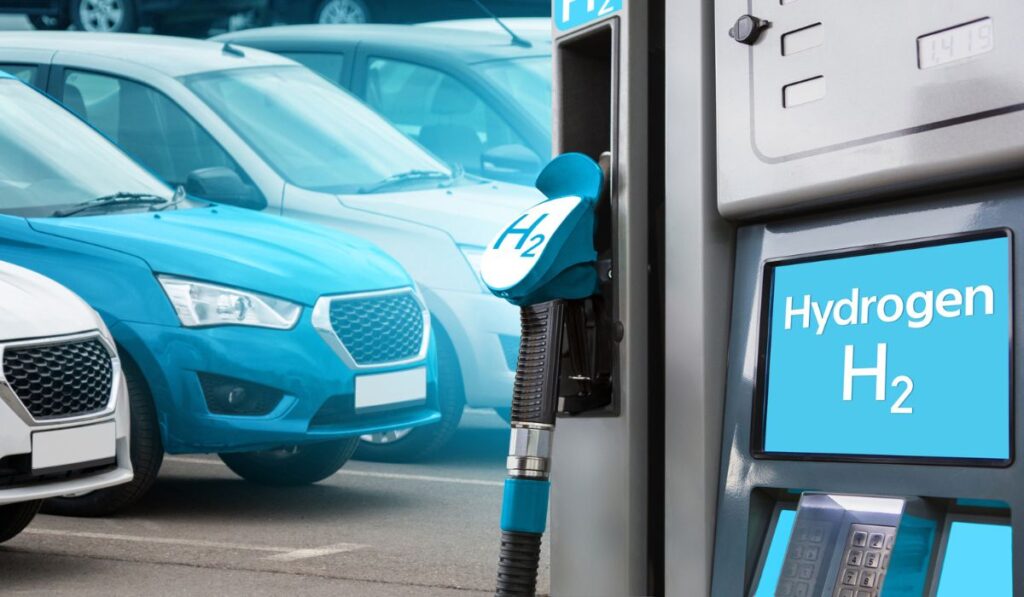Many drivers are switching to electric vehicles as a favorable alternative to traditional gas vehicles. These cars are environmentally friendly and cost-efficient to maintain. However, there’s one more alternative to the traditional vehicles to consider: hydrogen vehicles. So, how do these two types of eco-friendly vehicles stack up?
Electric and hydrogen cars both contribute to environmental sustainability, but the processes involved in their manufacturing and refueling still produce emissions. That said, hydrogen vehicles technically have a smaller environmental impact than electric cars.
Let’s discuss the features and environmental impact of both electric and hydrogen cars in detail. We’ll take a look at what exactly an electric car is, how the hydrogen car compares, and the pros and cons of each.
What Is an Electric Car?

While most conventional vehicles use fossil fuel to operate, an electric car is a vehicle that’s powered from electric energy stored in batteries. This energy is converted into mechanical energy through one or more electric motors.
The electricity used to power electric vehicles (EVs) can be produced through a renewable source of energy, which is why buying them contributes to environmental sustainability.
They also don’t produce toxins and pollutants, and are therefore seen as a much needed alternative to traditional internal combustion engine vehicles (ICEVs).
Here are some of the positive and negative electric car features that you should know about:
Electric Car Pros
There are multiple benefits of electric cars including:
- They don’t produce harmful emissions like carbon dioxide or poisonous sulfur oxide.
- They cost less to maintain over time.
- They’re highly durable since there are less moving parts involved.
- They’re more efficient than conventional cars in terms of cost per mile.
- Most electric cars have a modern and sleek design.
Electric Car Cons

While electric cars are better than gas powered ones in many respects, they also have their downsides. These include:
- The burning of fossil fuels produces most of the electricity currently used worldwide. When viewed from this perspective, the electricity generation causes harm to the environment that’s similar to the harm caused by ICEVs.
- The time it takes to recharge an electric vehicle isn’t practical for many people. Level 1 chargers, which typically come with the cars, take a whole day to fully change an electric car. Level 2 chargers take up to 12 hours, whereas level 3+ chargers are much faster.
- Electric cars are very expensive due to the fact that they’re using a new technology and the batteries are costly to produce.
What Is a Hydrogen Car?
In a conventional car, the fuel is mixed with oxygen in the tank, thereby creating energy through combustion. Hydrogen cars work in a similar way, except that instead of petrol, these cars use hydrogen gas as fuel.
Hydrogen cars have a fuel tank called a “fuel cell.” This tank stores the compressed hydrogen that is then sent to the fuel cells.
Hydrogen cars have fuel cells instead of an engine. The fuel cells are where oxygen is mixed with hydrogen, resulting in an electrochemical reaction and producing the energy needed to drive the car.
Electric energy from this reaction goes into operating a motor that then moves your car with mechanical energy. Hydrogen cars are also very powerful since hydrogen combustion provides more explosive energy.
Here are some unique features about hydrogen cars that you should know:
- They only produce water vapor as a by-product, unlike ICEVs that produce toxins like carbon dioxide gas.
- They work on principles half like that of ICEVS and half that of electric vehicles. This means that hydrogen cars store up gas in fuel cells which acts like a fuel tank, and use combustion to produce energy like ICEVS. However, the energy produced is electric and it operates a motor that moves the wheels of the car, just like in an electric vehicle.
- It takes only a few minutes for hydrogen cars to be refilled with hydrogen.
So, are hydrogen cars worth it? Let’s look at some of the pros and cons of hydrogen cars:
Hydrogen Vehicle Pros
While electric cars have stolen the spotlight in recent years, hydrogen cars aren’t too far behind. Here are some benefits of hydrogen cars:
- Hydrogen cars don’t emit harmful gasses that cause global warming and ozone layer depletion.
- Hydrogen cars take just minutes to be refilled — like conventional fuel cars — so you don’t have to wait for them to charge up, as is the case with electric cars.
- Hydrogen cars don’t need batteries like those used in electric and gasoline cars. Batteries lose strength over time, which means you’ll have to spend extra money on new batteries. Moreover, these batteries are produced through processes that emit carbon dioxide and other harmful emissions.
- Even without batteries, you’ll be surprised to know that hydrogen cars produce more energy than conventional cars and even modern electric car batteries.
Hydrogen Vehicle Cons
Despite their perceived environmental friendliness and efficiency, hydrogen cars have their downsides. Here are some reasons you may not want a hydrogen vehicle:
- Almost all of the hydrogen currently produced is from processes that require fossil fuel. These processes produce the same toxins and poisonous gasses that we want to avoid by switching to hydrogen and electric cars from conventional ones.
- The technology used to produce these cars is highly sophisticated and expensive. This is the reason most automobile companies haven’t invested in hydrogen cars.
For example, Honda stopped making their models of hydrogen cars last year, most probably because of the high manufacturing cost.
- It’s believed that the companies currently manufacturing hydrogen vehicles, Hyundai and Toyota, are making a marginal amount of profit or even less from these vehicles because the public isn’t as well informed about hydrogen cars as they are about electric cars.
- Hydrogen gas is highly flammable, which makes it extremely risky to be used in vehicles. However, there have been few accidents in these cars, and the manufacturing companies guarantee that the fuel cells and hydrogen tanks are built to survive crashes and accidents.
Nonetheless, people are concerned about their safety when it comes to hydrogen cars.
- There aren’t enough hydrogen filling stations available, with only around 200-250 hydrogen stations in the entire world. Most of these are in the United States, which has around 100 stations. The state that has the highest number of hydrogen vehicles and stations is California, with around 60 stations only.
Therefore, a hydrogen fuel cell vehicle will turn out to be practically useless for you if your state has very few or no hydrogen filling stations.
Popular Hydrogen Cars
Currently, the Toyota Mirai is the most sold hydrogen fuel cell vehicle, whereas Hyundai’s Nexo SUV is the second. Honda stopped making their Honda Clarity Fuel Cell in August 2021.
So far, thousands of hydrogen fuel cell vehicles have been sold and many countries are running their bus systems with this technology.
Comparison: Hydrogen Cars Vs. Electric Cars
Both hydrogen and electric cars are considered an improvement over conventional cars because they contribute to environmental sustainability. And both of these cars are equipped with the latest technologies that make your drive more comfortable.
However, there are still some breakthroughs needed to make these cars accessible to the general public at a reasonable cost.
Here’s a comparison of hydrogen and electric cars based on their features:
Efficiency
A fully charged electric car can go up to 250 miles before the battery dies, whereas a hydrogen car can go over 300 miles on a full tank. The 2021 Toyota Mirai can go even as far as 800 miles. So, in terms of mileage, hydrogen cars are far superior to electric cars.
However, there are arguments that electric cars are more fuel or energy efficient than hydrogen cars. This is because more electric power is required to operate a hydrogen car compared to an electric one.
Moreover, a lot of energy is lost in the electrolytic process involved in making electricity from hydrogen — more than when an electricity-storing battery is used. So, in this sense, electric cars are more efficient and cause less loss of energy.
Refueling Time
Hydrogen cars take 7-15 minutes to refill, just like gasoline cars. On the other hand, electric cars can take as long as 30 hours to fully recharge, which is a major downside.
Although newer electric chargers take much less time — around 25 minutes, in some cases — hydrogen cars beat electric cars when it comes to the time they take at the power station.
Costs
Electric cars, though more expensive than ICEVs, are cheaper than hydrogen cars. The prices for electric cars range from $27,000 (Nissan Leaf) to $121,000 (Tesla Model X).
On the other hand, the starting prices of the two hydrogen cars currently available, the Hyundai Nexo and the Toyota Mirai, are $58,000 and $50,000, respectively. This shows that electric cars are still somehow more budget friendly than hydrogen cars.
Furthermore, the refilling costs of hydrogen cars is higher than the recharging costs of electric cars. It will cost you between $70 and $90 to refill a hydrogen car, whereas the cost will be $10-$40 in the case of an electric car.
Nonetheless, keep in mind that hydrogen cars can take you farther with a full tank than an electric car with a full charge.
Environmental Friendliness
It’s fair to say that neither electric nor hydrogen cars are completely environmentally friendly at present. The batteries used in electric cars and the hydrogen used in hydrogen cars are produced through processes that involve fossil fuel combustion.
These cars were introduced to reduce such processes in the first place. So, the fuel that you managed to avoid through these cars is still being used in them — just indirectly.
Therefore, while both electric and hydrogen cars don’t harm the environment themselves, the fuel and body parts that they need to run are produced through environmentally hazardous ways.
To make either or both of these cars entirely environment friendly, there’s a need for major changes in the energy sector. Replacing non-renewable energy sources with renewable energy sources is important for environmental sustainability.
Will Hydrogen Cars Replace Electric cars?

Electric cars have become fairly common, at least in developed countries. On the other hand, hydrogen cars still aren’t as common, despite the modern technology available.
The reason for this slow progress of hydrogen cars is the complications in technology through which hydrogen is extracted, compressed, transported, and contained inside a hydrogen car.
Not only is the technology highly sophisticated, but it’s also very inconvenient and impractical due to a lack of infrastructure. Infrastructure is one of the biggest obstacles for hydrogen cars, and many countries are more focused on creating infrastructure for electric vehicles.
Furthermore, hydrogen cars are more expensive to purchase, refill, and maintain, which is why they haven’t caught on as well as electric cars.
Unless the infrastructure changes and companies find a renewable process to produce hydrogen, electric cars have a secure future. However, companies like BMW and Land Rover are planning on making hydrogen cars in the near future.
The Verdict: Are Hydrogen-Powered Cars Better for the Environment?
If you look at how the car functions, hydrogen cars are better for the environment. They produce less CO2 compared to electric cars since they don’t have lithium-ion batteries.
However, looking at the bigger picture, neither electric cars nor hydrogen cars are completely environmentally friendly. The electricity needed to run electric cars and the hydrogen used as the fuel in hydrogen cars are produced from processes that consume fossil fuels and result in pollution.
However, both types of car are preferable to gas powered vehicles and contribute to environmental sustainability.
